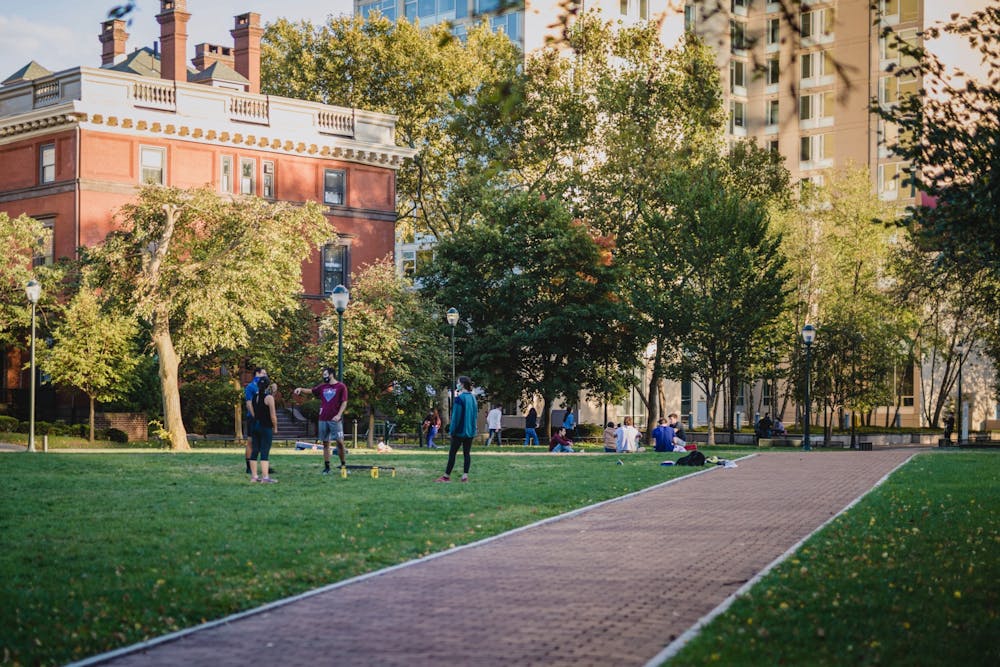
Students are skeptical of Penn’s ability to bring students back to campus in the spring, expecting an inevitable COVID-19 outbreak if the University does follow through with its plans for next semester.
Citing Penn's reversal of its fall 2020 plans just weeks before the start of the semester, students now doubt that the University will follow through with its current reopening plan for the spring. If Penn does open on-campus housing next semester, students are skeptical of the University’s ability to curb a COVID-19 outbreak by enforcing its Student Campus Compact and mandating participation in its COVID-19 testing program.
In a University-wide email sent Friday, Penn President Amy Gutmann, Provost Wendell Pritchett, Executive Vice President Craig Carnaroli, and Perelman School of Medicine Dean J. Larry Jameson announced that on-campus housing will be opened for the upcoming semester with the majority of classes still being taught remotely. Undergraduate students will be required to be tested twice weekly for COVID-19, enroll in PennOpen Pass, and follow the Campus Compact subject to social distancing guidelines.
College senior Sam Kaufmann, who is currently taking a gap year while enrolled in free online classes at Lehigh University, said he has little confidence that Penn will ultimately decide to open on-campus housing and increase in-person education in the spring. Although Penn touted its ability to “successfully minimize risk” through testing and tracing this semester, Kaufmann said the conditions of the pandemic will not have improved enough by the start of the spring semester to allow for an in-person campus experience.
“You can’t implement large scale in-person stuff like a university education under these circumstances,” Kaufmann said. “I think people in the Penn community need to start engaging with the idea that this is not going to magically go away.”
Kaufmann, who has no plans to return to Penn in the spring, added that he is skeptical of the University's ability to prevent an outbreak of the virus in on-campus housing due to their inability to enforce the Campus Compact.
The Campus Compact requires students to wear face masks when they leave their residences, maintain a six-foot social distance from others, and avoid large parties and gatherings.
Despite University and city restrictions, there have been a number of off-campus parties without social distancing taking place throughout the semester.
Penn Law second-year Brinna Ludwig, a graduate associate in Rodin College House, has similar concerns about the University’s ability to reopen this spring, as the United States is currently experiencing the highest number of daily cases since the pandemic surfaced in early March. Philadelphia County hit its highest number of daily cases on Oct. 26 at 1,030.
“I have a lot of concerns that fundamentally nothing has changed beyond the University’s testing capacity,” Ludwig said. “I wonder about the wisdom of bringing students going back who are going to have predominantly online classes.”

Ludwig is also concerned that Penn is using the policies they implemented this semester to justify bringing students back to campus, even though she said she has seen little information so far about how the University is enforcing student compliance with testing policies.
“I wonder, with the spring semester plan, if there is the infrastructure in place to enforce and to make sure there is compliance with the testing policies since it’s going to be a lot more students and they’re going to be tested twice per week,” Ludwig said.
In addition to increasing the frequency of required testing, Penn plans to open seven new testing sites and transition to a saliva-based testing system.
Ludwig said Penn’s announcement also stirred questions about how her role as a GA will change when students move into her hall on the 10th floor of Rodin, which currently has no residents. Despite the opening of on-campus housing, she hopes most College House programming will remain virtual to limit the coronavirus risk.
“I almost don't mind if the University flip flops, because I want them to be making a decision that ensures the safety of students and ensures the safety of community members and ensures the safety of faculty and staff,” Ludwig said. “If that means not bringing people back to campus, then that's the best thing to do and they should flip flop as much as they want.”
College first-year Megha Neelapu plans to live in on-campus housing if Penn reopens this spring but remains dubious that Penn will stick to their reopening plan.
“I’m very skeptical, especially considering what happened last semester where they told us we were going to be on campus and then a couple of weeks before we supposed to go they said ‘Nope! Just kidding,’” Neelapu said.
Neelapu, who is currently taking online classes from her home in Houston, added she is uncertain of how well her peers will socially distance if they too return to campus in January.
“If [my peers] don’t go through with that, it’s really easy to have an outbreak on campus and that outbreak would mean that the semester might be cut short,” Neelapu said.
Although Neelapu said she is personally committed to obeying social distancing requirements, she expects students to go to parties and other large social gatherings on campus.
“I really do not want to be the person who brings this virus onto campus and spreads it to the whole student body,” Neelapu said, “But I don’t think that will be the case for everyone, and I don’t even think that’s their fault. People are really tired of social distancing.”
College junior Jessica Bao, a previous DP copy staffer and writer for 34th Street Magazine, echoed Neelapu’s concerns of students not complying with Campus Compact regulations and adhering to social distancing measures.
Bao, who is currently living in The Radian, said she does not think Penn should bring students back to campus because of how the University has “washed its hands” of enforcing the Campus Compact. She added that she is aware of fraternities that are currently throwing parties on campus, and does not feel that Penn is doing enough to stop them.
“Even right now living on campus, the fact that I know there are people in my building going out makes me feel really nervous and makes me want to not leave my apartment,” Bao said. "I’m just really worried that if they bring people back and do not enforce the Campus Compact, it’s going to ruin it for the rest of us who really just want to hang out with a small pod of people."
If campus reopens and there is an outbreak of COVID-19, Bao said she might leave her off-campus apartment in the spring and go home to her family in New Jersey or Michigan.
“I’m just really worried that Penn can tell students you shouldn’t do these things and then trust that a lot of the students won’t,” Bao said. “I know some students will listen and some students definitely will not.”
The Daily Pennsylvanian is an independent, student-run newspaper. Please consider making a donation to support the coverage that shapes the University. Your generosity ensures a future of strong journalism at Penn.
Donate







